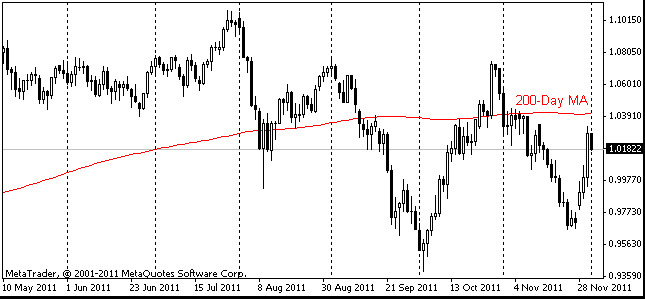EUR/usd
The World Bank has significantly cut its forecast for this year's global economic growth, expecting it to be at 2.5% instead of 3.6% as was predicted last summer. Hardly any of the international organizations, be it OECD, IMF or World Bank, has given a correct estimation of the growth potential over the last four years, however the slowdown trend is clear cut and many agree with this. As for Europe, its GDP is forecasted to decline by 0.3% at year-end. We believe that the recession will be especially strong during the first half of the year, after which the economy will set to rise. The current euro rate is too low now to improve the business sentiments in Germany. However, estimated by ZEW, quite a good leading indicator, business sentiment in Germany showed a very good improvement yesterday. The index soared by 32.2 points to -21.6. Yes, it is still negative, but it's the maximum level since July. This piece of news gave rise to the euro correction, bringing the pair from 1.2640 to 1.28. Later the euro moved down on the Wall Street sales, but now it is again at 1.28. As has already been mentioned, the technical overselling of the euro is evident; there are few unexecuted sell orders in the market. That's why now we observe a rather absurd situation: Greece cannot agree on the restructuring of its debts and may announce a default in the next few weeks, but the euro is on the rise. The scarce data from the U.S. support moderate optimism. The Empire State Manufacturing index, published yesterday, rose to 13.48 in January against 8.19 a month back. At the moment statistics set a favourable tone for the markets and don't allow for correction in the American markets.

GBP/USD
The actual data on British consumer prices coincided with the forecasts, having marked a decline in December price growth from the previous month's 4.8% to 4.2%. But retail prices turned out to be higher than expected, bringing the annual growth rate to 4.8% against 5.2% in November. We still believe that it is temporary and that January and February data will mark the inflation decline, which is already clear from some leading retailers' reports. Yesterday King didn't say much about the economy, and mainly focused on the supervisory role of the financial risk committee. On the whole King proposed to strengthen the coordination of the Central Bank and the HM Treasury to respond better to global economic risks. The market had been definitely expecting a greater negative, so the pound was supported by a short covering rally, it jumped to 1.54 during the London trading session but later corrected its course. For now the GBP/USD is attracting buyers just above 1.5330. To a certain extent it means that the Bank of England is unlikely to extend the QE at its February meeting, when the current programme is over.

USD/JPY
The Japanese currency remains almost calm, as no definite perspective can be drawn from the news. The Japanese growing stock exchanges support rise of the currency. Nikkei has been going up for 2 days in a row, having grown by 1.4%. But on the other hand, on positive news from the core European countries and U.S., the U.S. dollar is going down, which prevents the yen from falling against the USD. We will probably learn the winner very soon. Technically, the horizontal movement of the pair, observed over the last weeks, will soon cross the line of the downtrend. Now, this line passes through the 77.40 level, and the pair is trading around 76.70.

AUD/USD
The Australian dollar more than others has benefited from the increase in risk demand this week. Despite rather cautious data on the domestic economy, traders are buying aussie on the positive news from China, released yesterday. The growth of the world's second largest economy is still far from “hard landing”. In its turn this promises bright prospects to Australia, which directs a significant portion of its exports to that country. However, China alone won't keep Australia out of trouble; the domestic affairs should be also taken into consideration. And as we remember, car sales dropped by 2.9% in December, despite a decline in rates, and the consumer sentiment index has also displayed a reduction. Earlier on Monday we received information about one more drop in the number of adverts, which makes us feel cautious about tomorrow's labor market data. Analysts are expecting the employment growth by 10K. If it is true, the current Aussie rally can be considered justified. It's really interesting that the currency should be trading again near its 200-day moving average.
